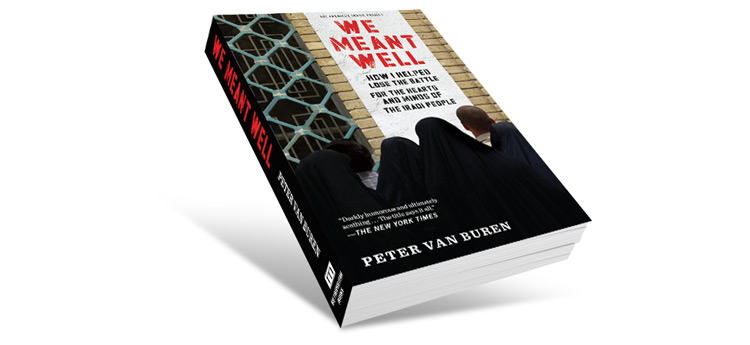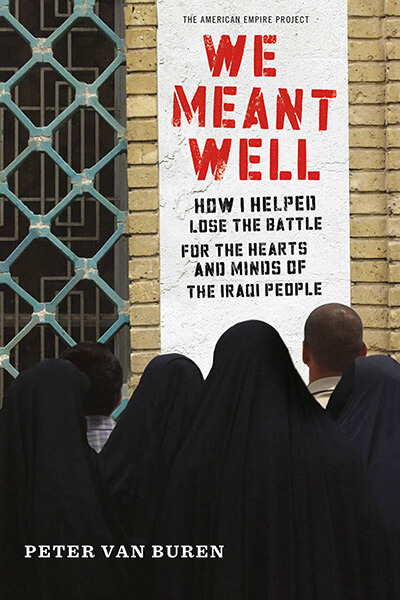
It’s Personal
Apologizing to My Daughter for the Last 15 Years of War
Peter Van Buren
I recently sent my last kid off for her senior year of college. There are rituals to such moments, and because dad-confessions are not among them, I just carried boxes and kept quiet. But what I really wanted to say to her — rather than see you later, call this weekend, do you need money? — was: I’m sorry.
Like all parents in these situations, I was thinking about her future. And like all of America, in that future she won’t be able to escape what is now encompassed by the word “terrorism.”
Everything Is Okay, But You Should Be Terrified
Terrorism is a nearly nonexistent danger for Americans. You have a greater chance of being hit by lightning, but fear doesn’t work that way. There’s no 24/7 coverage of global lightning strikes or “if you see something, say something” signs that encourage you to report thunderstorms. So I felt no need to apologize for lightning.
But terrorism? I really wanted to tell my daughter just how sorry I was that she would have to live in what 9/11 transformed into the most frightened country on Earth.
Want the numbers? Some 40{068cdbfab37e4f27da76d005a9c3d7cc8b4ae1429371040bf09b1dfe920189b4} of Americans believe the country is more vulnerable to terrorism than it was just after September 11, 2001 — the highest percentage ever.
Want the apocalyptic jab in the gut? Army Chief of Staff General Mark Milley said earlier this month that the threat remains just as grave: “Those people, those enemies, those members of that terrorist group, still intend — as they did on 9/11 — to destroy your freedoms, to kill you, kill your families, they still intend to destroy the United States of America.”
All that fear turned us into an engine of chaos abroad, while consuming our freedoms at home. And it saddens me that there was a different world, pre-9/11, which my daughter’s generation and all those who follow her will never know.
Growing Up
My kids grew up overseas while, from 1988 to 2012, I served with the State Department. For the first part of my career as a diplomat, wars were still discreet matters. For example, though Austria was a neighbor of Slovenia, few there were worried that the Balkan conflicts of the 1990s would spill across the border. Suicide bombers didn’t threaten Vienna when we visited as tourists in 1991. That a war could again consume large parts of the globe and involve multiple nations would have seemed as remote to us vacationers that year as the moon.
Even the big war of the era, Desert Storm in 1991, seemed remarkably far away. My family and I were assigned to Taiwan at the time and life there simply went on. There was no connection between us and what was happening in Kuwait and Iraq, and certainly we didn’t worry about a terror attack.
It’s easy to forget how long ago that was. Much of the Balkans is now a tourist destination, and a young soldier who fought in Desert Storm would be in his mid-forties today. Or think of it this way: either Hillary Clinton or Donald Trump on entering the Oval Office next January will be the fifth president in succession to bomb Iraq.
When September 11, 2001, arrived, I was on assignment to Japan, and like everyone, as part of a collective trauma, I watched the terrible events on TV. Due to the time difference, it was late at night in Tokyo. As the second plane hit the World Trade Center, I made sandwiches, suspecting the phone would soon ring and I’d be called to the embassy for a long shift. I remember my wife saying, “Why would they call you in? We’re in Tokyo!” Then, of course, the phone did ring, and I ran to grab it — not out of national security urgency, but so it didn’t wake my kids.
My daughter’s birthday falls on the very day that George W. Bush launched the invasion of Iraq. I missed her celebration in 2003 to stay at work preparing for the embassy to be overrun by al-Qaeda. I missed her birthday again in 2005, having been sent on temporary duty to Thailand to assist the U.S. Navy in setting up a short-term base there. When the naval officers mentioned the location they wanted to use to the Thai military liaison accompanying us, he laughed. That’s taken, he said, but you didn’t hear it from me, better ask your own people about it.
Later, I would learn that the location was a CIA black site where the country I then represented was torturing human beings.
Looking back, it’s remarkable to realize that, in response to a single day of terror, Washington set the Middle East ablaze, turned air travel into a form of bondage play, and did away with the best of our democracy.
Nothing required the Patriot Act, Guantánamo, renditions, drone assassinations, and the National Security Agency turning its spy tools inward. The White House kept many of the nastiest details from us, but made no secret of its broader intentions. Americans on the whole supported each step, and later Washington protected the men and women who carried out each of the grim acts it had inspired. After all, they were just following orders.
Protocols now exist allowing the president to select American citizens without a whit of due process for drone killing. Only overseas, he says, but you can almost see the fingers crossed behind his back. Wouldn’t an awful lot of well-meaning Americans have supported a drone strike in San Bernardino or at the Pulse club in Orlando? Didn’t many support using a robot to blow up a suspect in Dallas?
Back in the Homeland
The varieties of post-9/11 fear sneak up on us all. I spent a week this summer obsessively watching the news for any sign of trouble in Egypt while my daughter was there visiting some old embassy acquaintances. I worried that she was risking her life to see a high school friend in a country once overrun with tourists.
So I want to say sorry to my daughter and her friends for all the countries where we Americans, with our awkward shorts and sandals, were once at least tolerated, but that are now dangerous for us to visit. Sorry that you’ll never see the ruins of Babylon or the Great Mosque of Samarra in Iraq unless you join the military.
Arriving back in the U.S., my daughter called from the airport to say she’d be home in about an hour. I didn’t mention my worries that she’d be stopped at “the border,” a new name for baggage claim, or have her cell phone confiscated for daring to travel to the Middle East. An immigration agent did, in fact, ask her what her purpose was in going there, something even the Egyptians hadn’t bothered to question her about.
I also wanted to apologize to my daughter because, in our new surveillance world, she will never really know what privacy is. I needed to ask her forgiveness for how easily we let that happen, for all those who walk around muttering that they have nothing to hide, so what’s to worry about. I wanted to tell her how sorry I was that she’s now afraid of the police, not just for herself but especially for her friends of color. I wanted to tell her how badly I felt that she’d only know a version of law enforcement so militarized that, taking its cues from the national security state, it views us all as potential enemies and believes that a significant part of its job involves repressing our most basic rights.
I’m sorry, I want to say to her, that protesters can be confined in something called a “free speech zone” surrounded by those same police. I want to tell my daughter that the Founders would rise up in righteous anger at the idea of the police forcing citizens into such zones outside a political convention — and at the fact that most journalists don’t consider such a development to be a major story of our times.
As I sent her off to college, I wanted to say how sorry I was that we had messed up her world, sorry we not only didn’t defeat the terrorists the way Grandpa did the Nazis but, by our actions, gave their cause new life and endless new recruits. Al-Qaeda set a trap on 9/11 and we leaped into it. The prison American occupiers set up at Camp Bucca in Iraq became a factory for making jihadis, and the torture chambers at Abu Ghraib remain, like Guantánamo, an infomercial inviting others to pick up a weapon.
The New Normal
My daughter is not naïve. Like many of her classmates, she’s aware of most of these things, but she has no point of comparison. What fish truly sees the water around it? And imagine how much harder it’ll be for her future kids. Her adult life has been marked by constant war, so much so that “defeating the terrorists” is little more than a set phrase she rolls her eyes at. It’s a generational thing that’s too damn normal, like Depression-era kids still saving aluminum foil and paper bags in the basement after decades of prosperity.
I’m truly sorry that her generation copes with this by bouncing between cynicism and the suspension of disbelief. It was, in a way, that suspension of disbelief that allowed so many, including older people who should have known better, to accept the idea that invading Iraq was a reasonable response to an attack on America by a group of Saudis funded by Saudi “charity” donations. By now, “well, it wasn’t actually a crime” is little short of a campaign slogan for acts that couldn’t be more criminal. That’s a world on a path to accepting 2+2 can indeed equal 5 — if our leaders tell us it’s so.
We allow those leaders to claim that the thousands of American troops now stationed in Iraq are somehow not “boots on the ground,” or “ground troops.” Drone strikes, we’re told, are surgical, killing only bad guys with magic missiles, and never purposely hitting civilians, hospitals, children, or wedding parties. The deaths of human beings in such situations are always rare and accidental, the equivalent of those scratches on your car door from that errant shopping cart in the mall parking lot.
Cleaning Up After Dad
If anyone is going to fix this mess, I want to tell my daughter, it’s going to have to be you. And I want to add, you’ve got to do a better job than I did — if, that is, you really want to find a way to say thanks for the skating lessons, the puppy, and that night I didn’t get angry when you violated curfew to spend more time with that boy.
After the last cardboard boxes had been lugged up the stairs, I held back my tears until the very end. Hugging my daughter at that moment, I felt as if I wasn’t where I was standing but in a hundred other places. I wasn’t consoling a smart, proud, twenty-something woman, apprehensive about senior year, but an elementary school student going to bed on the night that would forever be known only as 9/11.
Back home, the house is empty and quiet. Outside, the leaves have just a hint of yellow. At lunch, I had some late-season strawberries nearly sweet enough to confirm the existence of a higher power. I’m gonna really miss this summer.
I know I’m not the first parent to grow reflective watching his last child walk out the door, but I have a sense of what’s ahead of her: an American world filled with misplaced fears. Fear is a terrible thing to be sorry for, and that in itself can be scary.

